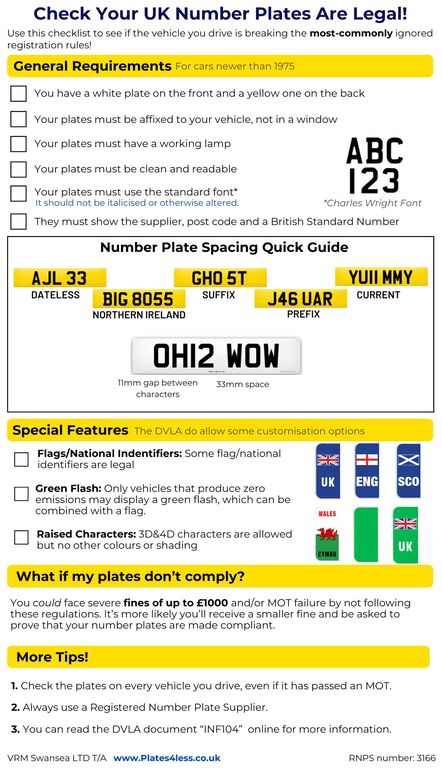Under an obscure number plate rule, drivers face fines of up to £1,000, with related offences increasing by as much as 318% across the UK.
Number plates play a critical role in vehicle identification, ensuring each vehicle is distinguishable for data tracking, storage, and processing. The DVLA insists on strict adherence to number plate display regulations.
Major offences entail either removing or not displaying number plates. Other violations include rearranging the letters and numbers or obscuring parts of the plate.
Plates4Less submitted a Freedom of Information request to most of the police forces across the UK to find out how often number plate offences are committed, establish if there is a trend and find out what is being done to combat these issues.
The shocking statistics showed that some areas have confirmed they have seen a huge increase in all number plate violations, such as an increase of 318% in the Greater Manchester area (between 2019-2022), which of course is extremely concerning to motorists. Number plate violations reported include “not displaying a front or rear plate”, “obscuring the registration mark” and “failure to conform to number plate regulations”.
West Mercia statistics show that the numbers for “Drive a vehicle when the registration mark fails to conform with regulations” went up by 18% from 230 in 2021, to 271 in 2022.
Whilst not all areas are affected equally by number plate violations there seems to be a growing trend for motorists in major UK cities failing to display a front number plate.
Merseyside saw increases of 18% regarding vehicles “failing to display a front number plate”. Merseyside is not alone with Humberside, Wiltshire & Essex having also seen rises in the levels of motorists failing to display their front number plate.
However, not all areas have reported an increase. For example, West Midlands recorded 57 instances of driving without a front number plate in 2021, and only 34 in 2022. Similarly, Hertfordshire Constabulary’s figures for this crime have been dropping since 2020. This could indicate crimes dropping, or just less drivers getting caught.
With an increased reliance on Automatic Number Plate Recognition (ANPR) to police our roads, experts at www.Plates4Less.co.uk say that they expect to see more policing of number plate regulations.
Why do cars have no front number plates and do rules apply to ‘supercars’?
Some drivers will intentionally remove front plates, or refuse to get them, because they worry about ruining the aerodynamic aesthetic of their vehicles. This is more commonplace with drivers of supercars.
This has been an ongoing issue for many years. In 2018, the Daily Mail reported that “Dozens of wealthy owners living in the most exclusive areas of London have dispensed with plates on their Lamborghinis and Ferraris.”
Antony Clark, an expert at Plates4Less, made the point that these cases seem to be on the rise with police forces across the UK posting about it daily.
He said: “In the case of Supercars, the rules do still apply to them but it seems that a monetary fine is not a deterrent. These consequences are not harsh enough to people who can afford such expensive cars.
“If we want to see a decrease in number plate crime, authorities might need to consider alternatives, such as points on a licence or detaining vehicles.”
While DVLA are able to enforce up to a £1,000 fine, smaller fines and requests that the criminal simply change their plates are far more common, which may be contributing to the spread of number plate crime in the UK.
How to know if your number plate is breaking the law?

Legally, a driver needs to ensure their vehicle is road legal before driving, and this includes checking the number plates. It is not a defence to say that the plate was on the car when you purchased it from its previous owner, as you could be fined for failing to fix the issue.
If you are driving with a second-hand vehicle and therefore plate, or even just sharing a vehicle, then it’s worth checking your number plate legality. Even if you got your plate from a reputable local dealership, your car recently passed an MOT, or it is a work vehicle, it could still be breaking the law as many dealers and testers are not stringent with the law.
Antony added: “Don’t risk a £1000 fine, check your number plate is valid before the next time that you drive.”
According to the Government rules: “Number plates (also known as licence plates) must show your registration number correctly. You cannot rearrange letters or numbers, or alter them so that they’re hard to read.”
To help drivers avoid being fined by the police for breaching number plate rules, www.Plates4Less.co.uk have developed a number plate checklist. It outlines the most commonly broken rules associated with number plates and allows drivers to be sure they are not unknowingly committing an offence. To find out more, visit www.plates4less.co.uk/is-my-number-plate-legal.

